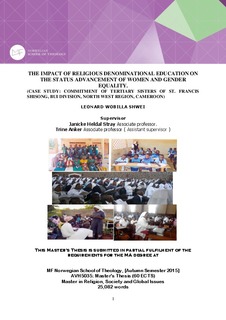| dc.contributor.author | Shwei, Leonard Wobilla | |
| dc.date.accessioned | 2015-10-01T11:21:11Z | |
| dc.date.available | 2015-10-01T11:21:11Z | |
| dc.date.issued | 2015-10-01 | |
| dc.identifier.uri | http://hdl.handle.net/11250/1590320 | |
| dc.description.abstract | Discrimination between genders creates an unjust society that no longer guarantees equal rights and opportunities for its citizens. It creates a climate of suspicion injustice and domination between individuals; it condemns them to live in fear and insecurity.
Originally, the traditional practice has been to relegate the girl child and women in all spheres in the society and particularly in Bui Division in Cameroon and other parts of the world. To a larger extent, this has brought about glaring features of gender inequality and denigration of the status of women. The prevalence of this attracted the attention of the Tertiary Sisters of Saint Francis, (TSSF) Shisong, North West Region of the Republic of Cameroon, to engage in the education of women in institutions; all these aimed at improving upon their situation. Basing the foundations on the teachings of the gospel and religious motivations of different forms.
The fundamental question is: “In the commitment to religious denominational education, in view of advancing the status of women and ensuring gender equality in Bui Division, to what extent has the Franciscan Sisters succeeded in meeting up the essentials of education as guaranteeing freedom and over-coming opposing cultural obstacles towards woman?”
This question is answered in five chapters of this thesis. Chapter one shows the historical background and inspirational features of Tertiary Sisters of Saint and women education; chapter two looks on how far the education and status advancement of women and gender equality by the sisters has been attained; chapter three on its part considers the application of UNESCO and the Cameroon Government Policy of women`s education. This indicates that what has been done so far is in line with universal declarations or norms. Chapter four delves into critical analyses with the use of Paulo Freire’s lenses to examine his role or concern; and chapter five looks at the relevance and impact of denominational education of women by the Tertiary Sisters. This further indicates the successes registered; thus, making it obvious that the enterprise and efforts of the Tertiary Sisters of St Francis in the education of women has not been fruitless but still needs more steps forward considering the evolution of the society. | nb_NO |
| dc.language.iso | eng | nb_NO |
| dc.subject | kvinner | nb_NO |
| dc.subject | utdanning | nb_NO |
| dc.subject | Kamerun | nb_NO |
| dc.subject | The Tertiary Sisters of Saint Francis (TSSF) | nb_NO |
| dc.subject | Shisong | nb_NO |
| dc.title | The impact of religious denominational education on the status advancement of women and gender equality | nb_NO |
| dc.type | Master thesis | nb_NO |
| dc.subject.nsi | VDP::Humanities: 000::Theology and religious science: 150::Religious science, religious history: 153 | nb_NO |
| dc.subject.nsi | VDP::Social science: 200::Women's and gender studies: 370 | nb_NO |
| dc.source.pagenumber | 80 | nb_NO |
